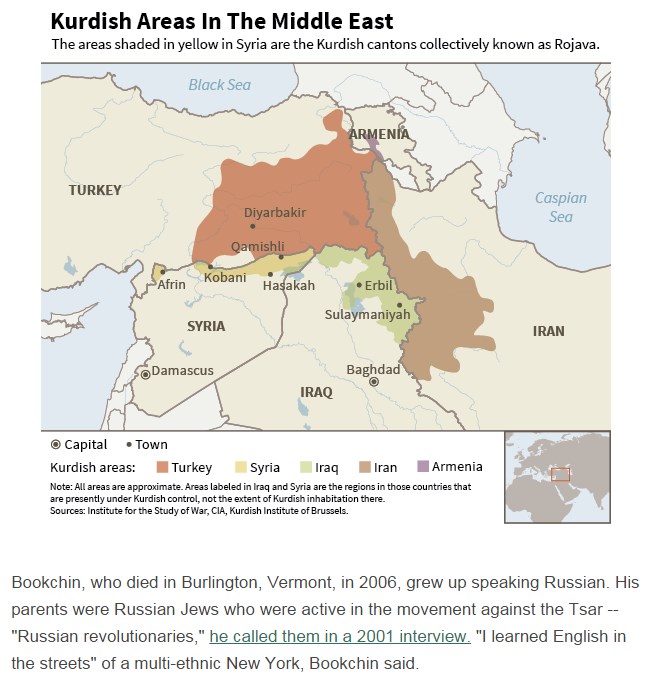dimondsმაგარი ხარ

America's Best Allies Against ISIS Are Inspired By A Bronx-Born Libertarian Socialist
Syrian Kurds have launched an unlikely radical experiment in governance without hierarchy, patriarchy or capitalism.
12/18/2015 04:57 pm ET | Updated 22 hours ago
Akbar Shahid Ahmed
Foreign Affairs Reporter, The Huffington Post
http://www.huffingtonpost.com/entry/syrian...tushpmg00000003 ISTANBUL -- Last fall, Islamic State fighters launched a coordinated, large-scale assault on the Kurdish town of Kobani on Syria's northern border with Turkey. Fresh from victories that granted them an aura of invincibility, the extremists were about to remove the single irritant on a wide swath of the border they otherwise controlled.
The world watched in resignation. The lone superpower said it would not help. U.S. officials grimly predicted the city would fall. Yet the small band of Kurds held on for days, then weeks. The U.S.-led coalition against the self-described Islamic State began to help, first with a smattering of airstrikes then with daily assaults. And by January, in a stunning turnabout that has been called a contemporary Stalingrad, the Kurds won.
In succeeding, the Syrian Kurds defended not just a strategic outpost in the Middle East, but also a utopian idea of government they're putting into practice -- what they talk about as a space where decisions are made at the neighborhood level, where gender equity and ethnic inclusion are legally mandated, and where barter is becoming more important than currency.
The Kurds' inspiration? Survival, sure. But also the ideas of one specific Bronx-born, Vermont-based philosopher. Their leaders developed their guiding philosophy out of a long engagement with Murray Bookchin, who fused Marxist and anarchist ideals into a vision of a world where citizens' assemblies supplant state bureaucracy and environmentalism is king. A contemporary of Democratic presidential hopeful Sen. Bernie Sanders, Bookchin considered the socialist politician far too conservative.
Bookchin, who described himself as a libertarian socialist, died nearly a decade ago. His passing sparked a celebration of his life in the Kurdish regions. And now, Syrian Kurds have -- at the urging of Abdullah Ocalan, an imprisoned Kurdish icon -- built a Bookchin-inspired society that is the antithesis of the Islamic State.
The territory where the 1.5 million or so Syrian Kurds have launched this social experiment, carved out of the wreck of Bashar Assad's police state, includes Kobani and two other small "cantons," or regions. They call it all Rojava -- "Western Kurdistan" in Kurdish, the language the Syrian Kurds have only been able to use freely since Assad's control loosened a handful of years ago.
Washington sees the Syrian Kurds' success defending Kobani -- and other parts of Rojava -- as the chief example of how U.S.-led air power and partnerships with forces on the ground can effectively defeat the Islamic State.
But this is an especially odd partnership. The Syrian Kurds' ties to Ocalan and the PKK, the designated terrorist organization he leads, enrage Turkey, the most important U.S. ally in the region. And the Rojava vision is dramatically at odds with the more feudal nationalism of another group of Kurds who are used to being Washington's favorites -- those in Iraq. The Syrian Kurds' growing autonomy and unwillingness to launch an all-out offensive against Assad has also upset the Syrian Arab nationalist rebels that the U.S. has courted for years.
A quarter century after the fall of the Berlin Wall suggested the taming of the left, the U.S. is providing air cover for radical Marxist-inspired militants its closest allies can't stand.
* * *
რატომ სძულთ, ეგეც იცოდი .................................?
მიმაგრებული სურათი



